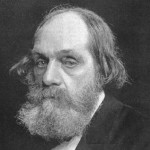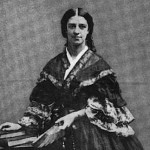
Edward Everett Hale
Edward Everett Hale was an American author, historian and Unitarian clergyman. He was a child prodigy who exhibited extraordinary literary skills. He graduated from Boston Latin School at age 13, then enrolled at Harvard University where he won two Bowdoin prizes and was elected the Class Poet. In 1839, Hale graduated second in his class and then studied at Harvard Divinity School. He was licensed to preach as a Unitarian minister in 1842 by the Boston Association of Ministers. He later left the Unity Church in 1856 to become pastor at the South Congregational Church where he served until 1899.
His best known work was ?The Man Without a Country? which was published in the Atlantic?in 1863 and it was intended to strengthen support for the Union cause in the North. He employed a minute realism which led his readers to suppose the narrative a record of fact. Hale?s short story ?The Brick Moon?, serialized in the Atlantic Monthly, is the first known fictional description of an artificial satellite. He assisted in founding the Christian Examiner, Old and New?in 1869 and became its editor. In 1875, the Christian Examiner?merged with Scribner?s Magazine. Hale became Chaplain of the United States Senate in 1903 and the following year he was elected as a member of the Academy of Arts and Sciences.

Nathan Hale
Hale was born on April 3, 1822 in Boston, Massachusetts to Nathan Hale and Sarah Preston Everett. Nathan Hale founded the Boston Daily Advertiser?in 1813 serving as editor and publisher until his death in 1863. He was one of the founders of the North American Review?in 1815 and the Christian Examiner?in 1823. Hale was active in promoting industrial improvement, especially the Boston and Albany Railroad and diverting the Lake Cochituate for potable water in the Back Bay, the Neck and the South Cove.
Charles Hale, Edward Hale?s brother, was a legislator in the Massachusetts state House and Senate intermittently between 1855 and 1877. He was house speaker in 1859 and in the 1860s he lived in Cairo, Egypt as the American consul-general. In Cairo he arrested the conspirator, John Surratt, suspected of plotting the assassination of Abraham Lincoln.

Susan Hale
Edward Hale?s sister was author, traveler and artist Susan Hale. Without any particular teaching, she learned to draw and to paint early in life. She became a teacher when her father became ill and the family income needed to be supplemented. In 1872, she studied art in Paris, France and Weimar, Germany to get the best training in watercolor she could for nearly a year. When she returned she began giving lessons in watercolors. She educated her niece Ellen Day Hale, daughter of Edward and his wife Emily Baldwin Perkins, who became a painter and printmaker. Ellen Day Hale?s 1893 portrait, June, which depicts a young woman sewing, wearing a bun and checked dress, is in the collection of the National Museum of Women in the Arts.
Edward Everett Hale?s fourth great-grandfather was Richard Everett, founder of both Springfield, Massachusetts and Dedham, Massachusetts. Edward?s uncle was Edward Everett, one of the great American orators of the ante-bellum and Civil War era. He is often remembered today as the featured orator at the dedication ceremony of the National Cemetery in Gettysburg in 1863, where he spoke for two hours, immediately before President Abraham Lincoln delivered his famous, two-minute Gettysburg Address.
Did you know Edward Everett Hale is related to Abraham Lincoln? Edward Everett Hale is Abraham Lincoln?s?11th cousin once removed.
Check out Edward Everett Hale?s family tree and see how you may be related!
Source: http://www.geni.com/blog/family-tree-tuesday-edward-everett-hale-379293.html
fenway park philadelphia flyers 4/20 student loan forgiveness ufc 145 weigh ins record store day 2012 detroit red wings
No comments:
Post a Comment
Note: Only a member of this blog may post a comment.